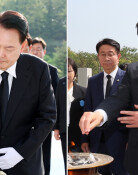Prosecution to collectively indict 3 lawmakers on Monday
Prosecution to collectively indict 3 lawmakers on Monday
Posted September. 13, 2014 03:17,
Special Investment Departments 1 and 2 at the Seoul Central District Public Prosecutors Office will collectively indict on Monday three lawmakers who have not been arrested despite of corruption charges against them. The trio are Rep. Shin Kye-ryun (60) and Rep. Shin Hak-yong (62) of the main opposition New Politics Alliance for Democracy, for which arrest warrants were sought by prosecution due to the charge of lobbying for legislation and other charges but not issued by court; and Rep. Song Kwang-ho (72) of the ruling Saenuri Party, whose arrest was voted down by lawmakers in a parliamentary vote.
Prosecutors discovered an additional charge against Rep. Shin of taking gift certificates from Lee Min-seong, board chairman of the Seoul Arts College, and are set to add it to other charges faced by the lawmaker. Prosecutors originally planned to seek an arrest warrant for Shin by adding the charge, but changed its plan after a bill seeking arrest of Rep. Song was voted down by the National Assembly. A prosecution source said, We judged that we cannot break down grand cartel formed by lawmakers, as long as the regular parliamentary session continues through December.
On Songs contacting with lawmakers without leaving the main assembly hall while the vote on the bill seeking his own arrest was underway, insiders in the prosecution said, How can the bill be passed when (he) continued campaigning to the last minute, adding, A provision obliging the lawmaker against whom a vote is underway to leave the main assembly hall is needed. When a bill seeking approval for a lawmakers arrest was voted, it was customary that the lawmaker in question left the assembly hall after delivering speech to excuse him or her, but Song remained at the voting booth in the hall, and shook hands with lawmakers waiting in line to vote one by one. A source at the National Assembly Secretariat said, Since there is no specific binding rule, it is only up to judgment by the lawmaker concerned.







